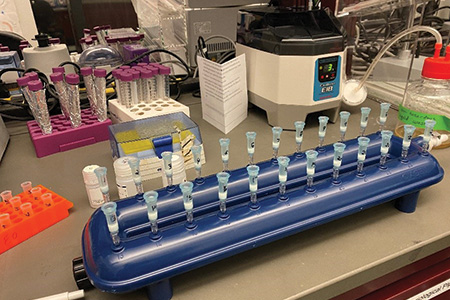
Native biological molecules are generally poorly suited for use in synthetic systems, this capability is focused on developing building blocks motors with enhanced stability and providing strategies for bridging living and non-living components through a common interface and functional material or system.
Capabilities include:
- Recombinant protein production in prokaryotic and eukaryotic cells:
- Drosophila kinesin-1 motor proteins including full length, standard and zinc-dependent switchable motors, and truncated standard and switchable motors with biotinylated tails.
- A thermostable monomeric kinesin (kinesin-3) motor originally isolated from Thermomyces lanuginosus.
- Bacteriorhodopsin, light-driven proton pump library including native and recombinant (e.g., His-tag, Cys mutants, etc) versions.
- Genetic engineering of biomolecules via sub-cloning, 3D modeling, and site-directed mutagenesis (SDM) methods.
- Functionalization chemistries for biomolecule attachment to of bio-compatible nanoparticles including semiconductor, metal, and magnetic nanocrystals.
- Spectrophotometric capabilities to characterize enzyme kinetics and performance in hybrid, abiotic-biotic materials and systems.
Contact: George Bachand
Research Highlights:
Kinesin-Recruiting Microtubules Exhibit Collective Gliding Motion While Forming Motor Trails
Tsitkov, S.; Song, Y. C.; Rodriguez, J. B.; Zhang, Y. F.; Hess, H. ACS Nano 2020, 14, 16547-16557. doi: https://pubs.acs.org/doi/10.1021/acsnano.0c03263
The Effects of Osmolytes on In Vitro Kinesin-Microtubule Motility Assay
VanDelinder, V.S.; Sickafoose, I.; Imam, Z.I.; Ko, R.; Bachand, G.D. RSC Adv. 2020, 10, 42810-42815. doi: doi.org/10.1039/D0RA08148E
